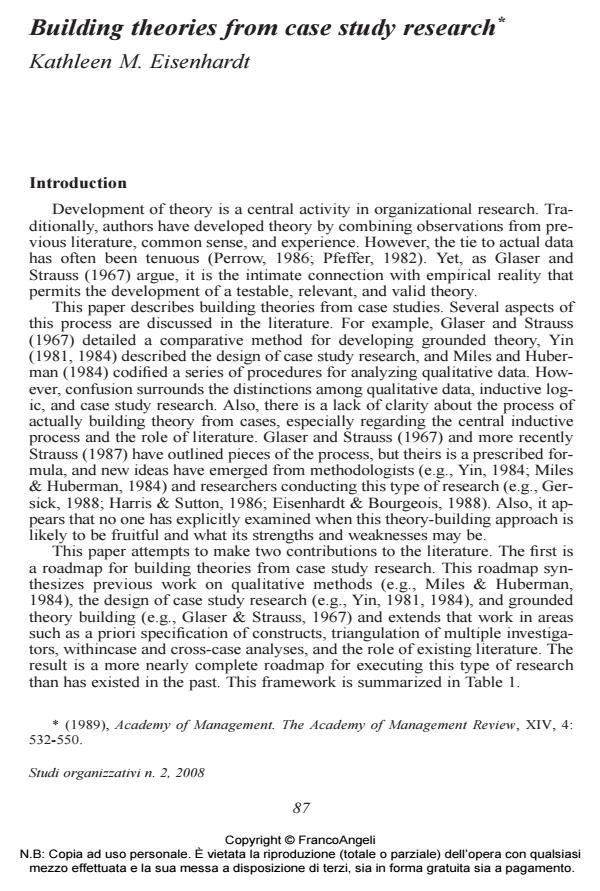Building theories from case study research
Titolo Rivista STUDI ORGANIZZATIVI
Autori/Curatori Kathleen M. Eisenhardt
Anno di pubblicazione 2009 Fascicolo 2008/2
Lingua Inglese Numero pagine 0 P. Dimensione file 457 KB
DOI 10.3280/SO2008-002004
Il DOI è il codice a barre della proprietà intellettuale: per saperne di più
clicca qui
Qui sotto puoi vedere in anteprima la prima pagina di questo articolo.
Se questo articolo ti interessa, lo puoi acquistare (e scaricare in formato pdf) seguendo le facili indicazioni per acquistare il download credit. Acquista Download Credits per scaricare questo Articolo in formato PDF

FrancoAngeli è membro della Publishers International Linking Association, Inc (PILA)associazione indipendente e non profit per facilitare (attraverso i servizi tecnologici implementati da CrossRef.org) l’accesso degli studiosi ai contenuti digitali nelle pubblicazioni professionali e scientifiche
Building Theories From Case Study Research - This paper describes the process of inducting theory using case studies from specifying the research questions to reaching closure. Some features of the process, such as problem definition and construct validation, are similar to hypothesis-testing research. Others, such as within-case analysis and replication logic, are unique to the inductive, case-oriented process. Overall, the process described here is highly iterative and tightly linked to data. This research approach is especially appropriate in new topic areas. The resultant theory is often novel, testable, and empirically valid. Finally, framebreaking insights, the tests of good theory (e.g., parsimony, logical coherence), and convincing grounding in the evidence are the key criteria for evaluating this type of research.
- Former à l’interdisciplinarité via l’intégration du design à la gestion de projet : apports et limites dans une école d'ingénieurs Emilien Jacob, Florian Magnani, in Revue internationale de pédagogie de l’enseignement supérieur /2024
DOI: 10.4000/130wz - Crisis and crisis management in the Upper Franconian textile industry Margitta Grötsch, in Review of Evolutionary Political Economy /2025 pp.157
DOI: 10.1007/s43253-024-00138-w - Exploring Communication and Networks Using Social Network Analysis Qing Li, Nicky Shaw, Victor Shi, in Journal of Global Information Management /2022 pp.1
DOI: 10.4018/JGIM.301198
Kathleen M. Eisenhardt, Building theories from case study research in "STUDI ORGANIZZATIVI " 2/2008, pp , DOI: 10.3280/SO2008-002004